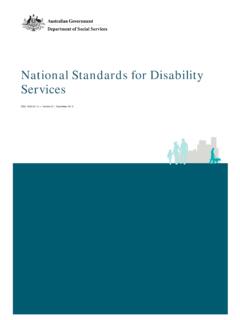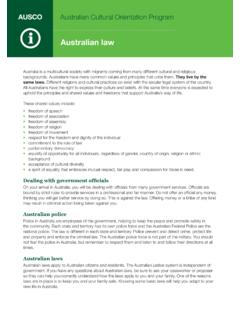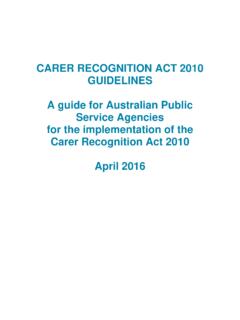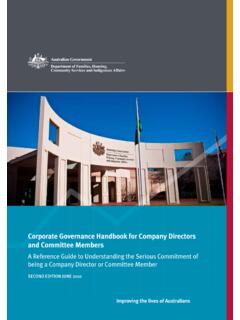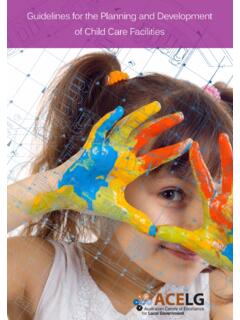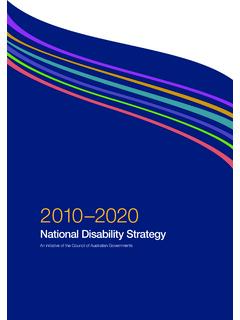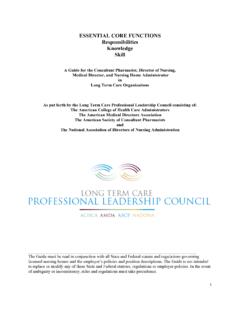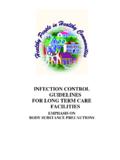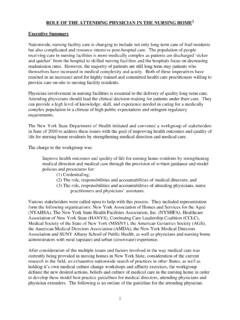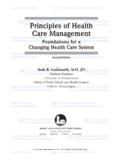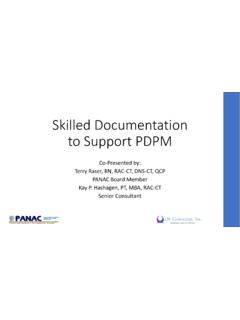Transcription of PRINCIPLES TO DETERMINE THE RESPONSIBILITIES OF THE …
1 1 27 November 2015 PRINCIPLES TO DETERMINE THE RESPONSIBILITIES OF THE NDIS AND OTHER SERVICE SYSTEMS All governments have agreed that our vision is for an inclusive Australian society that enables people with disability to fulfil their potential as equal citizens. To achieve this vision, all Australian governments, non-government organisations, business and the wider community have a role to play. The interactions of the NDIS with other service systems will reinforce the obligations of other service delivery systems to improve the lives of people with disability, in line with the National Disability Strategy. Governments agree that the PRINCIPLES outlined in this document will be used to DETERMINE the funding and delivery RESPONSIBILITIES of the NDIS in achieving this vision. The NDIS launch sites provide governments with an opportunity to review interactions between the NDIS and other service systems and consider any lessons arising out of launch.
2 These applied PRINCIPLES , and arrangements needed to operationalise them, have been reviewed through the process set out in Part 8 of the Intergovernmental Agreement for the NDIS Launch. Based on this review and on the lessons from trial, the Disability Reform Council may provide advice to COAG on amendments to the Applied PRINCIPLES and tables of supports . The Agency Board may also report to the Disability Reform Council and COAG on the operation and effectiveness of the interface with other service systems. 1. People with disability have the same right of access to services as all Australians, consistent with the goals of the National Disability Strategy which aims to maximise the potential and participation of people with disability. 2. The NDIS will fund personalised supports related to people s disability support needs, unless those supports are part of another service system s universal service obligation (for example, meeting the health, education, housing, or safety needs of all Australians) or covered by reasonable adjustment (as required under the Commonwealth Disability Discrimination Act or similar legislation in jurisdictions).
3 3. Clear funding and delivery RESPONSIBILITIES should provide for the transparency and integrity of government appropriations consistent with their agreed policy goals. 4. There should be a nationally consistent approach to the supports funded by the NDIS and the basis on which the NDIS engages with other systems, noting that because there will be variation in non-NDIS supports funded within jurisdictions there will need to be flexibility and innovation in the way the NDIS funds and/or delivers these activities. 5. In determining the approach to the supports funded by the NDIS and other service systems governments will have regard to efficiency, the existing statutory RESPONSIBILITIES and policy objectives of other service systems and operational implications. 6. The interactions of people with disability with the NDIS and other service systems should be as seamless as possible, where integrated planning and coordinated supports, referrals and transitions are promoted, supported by a no wrong door approach.
4 2 27 November 2015 Applied PRINCIPLES and tables of services In addition to the six general PRINCIPLES , applied PRINCIPLES have been developed in a range of other service systems to assist governments to further define the funding RESPONSIBILITIES during the launch of the NDIS. There is also a table of specific activities funded by the NDIS and by other systems for each of these other service systems. The purpose of this document is to define the activities funded by the NDIS and other systems and it does not intend to place additional obligations on other systems. Responsibility for the identified activities will be reviewed based on the NDIS launch experience. Applied PRINCIPLES and more detailed tables of funding RESPONSIBILITIES have been developed for: 1. Health 7. Employment 2. Mental health 8. Housing and community infrastructure 3. Early childhood development 9. Transport 4. Child protection and family support 10.
5 Justice 5. School education 11. Aged care 6. Higher education and Vocational Education and Training (VET) 3 27 November 2015 1. HEALTH Note: In applying these PRINCIPLES , consideration will be given to alignment with services funded under the National Health Reform Agreement, with a view to avoiding overlap or gaps. APPLIED PRINCIPLES HEALTH 1. Commonwealth and State and Territory health systems have a commitment to improve health outcomes for all Australians by providing access to quality health services based on their needs consistent with the requirements of the National Healthcare Agreement and other national agreements and in line with reasonable adjustment requirements (as required under the Commonwealth Disability Discrimination Act or similar legislation in jurisdictions). 2. The above health system will remain responsible for the diagnosis, early intervention and treatment of health conditions, including ongoing or chronic health conditions.
6 This may involve general practitioner services, medical specialist services, dental care, nursing , allied health services, preventive health care, care in public and private hospitals, and pharmaceuticals (available through the PBS). 3. Health systems are responsible for funding time limited, recovery-oriented services and therapies (rehabilitation) aimed primarily at restoring the person s health and improving the person s functioning after a recent medical or surgical treatment intervention. This includes where treatment and rehabilitation is required episodically. 4. The NDIS will be responsible for supports required due to the impact of a person s impairment/s on their functional capacity and their ability to undertake activities of daily living. This includes maintenance supports delivered or supervised by clinically trained or qualified health professionals (where the person has reached a point of stability in regard to functional capacity, prior to hospital discharge (or equivalent for other healthcare settings) and integrally linked to the care and support a person requires to live in the community and participate in education and employment.)
7 5. The NDIS and the health system will work together at the local level to plan and coordinate streamlined care for individuals requiring both health and disability services recognising that both inputs may be required at the same time or that there is a need to ensure a smooth transition from one to the other. 4 27 November 2015 INDICATIVE ROLE OF THE NDIS AND OTHER PARTIES HEALTH REASONABLE AND NECESSARY NDIS SUPPORTS FOR ELIGIBLE PEOPLE OTHER PARTIES Elements of community re-integration which enable the person to live in the community such as assistance with activities of daily living and home modifications. Active involvement in planning and transition support, on the basis of the person having reached a point of stability in regard to functional capacity, prior to hospital discharge (or equivalent for other healthcare settings) wherever there is a need for ongoing maintenance support. Prosthetics, orthoses and specialist hearing and vision supports (excluding surgical services) where these supports directly relate to a person s permanent impairment.
8 Allied health and other therapy directly related to maintaining or managing a person s functional capacity including occupational therapy, speech pathology, physiotherapy, podiatry, and specialist behaviour interventions. This includes long term therapy/support directly related to the impact of a person s impairment/s on their functional capacity required to achieve incremental gains or to prevent functional decline. Also includes allied health therapies through early intervention for children aimed at enhancing functioning. The delivery of nursing or delegated care by clinically trained staff (directly or through supervision), where the care is required due to the impact of a person s impairment/s on their functional capacity and integral to a person s ongoing care and support to live in the community and participate in education and employment (including, but not limited to, PEG feeding, catheter care, skin integrity checks or tracheostomy care (including suctioning).)
9 The delivery of routine personal care required due to the impact of a person s impairment/s on their functional capacity to enable activities of daily living ( routine bowel care and oral suctioning) including development of skills to support self-care, where possible. Any funding in a person s package would continue for supports for people with [Jointly with NDIS] Provision of specialist allied health, rehabilitation and other therapy, to facilitate enhanced functioning and community re-integration of people with recently acquired severe conditions such as newly acquired spinal cord and severe acquired brain injury. Acute and emergency services delivered through Local Hospital Networks including, but not limited to, medical and pharmaceutical products (available through PBS), medical transport, allied health and nursing services (where related to treatment of a health event), dental services and medical services covered under the Medicare Benefits Schedule, or otherwise government funded (including surgical procedures related to aids and equipment).
10 Sub-acute services (palliative care, geriatric evaluation and management and psychogeriatric care) including in-patient and out-patient services delivered in the person s home or clinical settings. Rehabilitative health services where the purpose is to restore or increase functioning through time limited, recovery oriented episodes of care, evidence based supports and interim prosthetics, following either medical treatment or the acquisition of a disability (excluding early interventions). When a participant is receiving time limited rehabilitation services through the health system, the NDIS will continue to fund any ongoing maintenance allied health or other therapies the person requires and that are unrelated to the health system s program of rehabilitation. Preliminary assessment and disability diagnosis as required for the determination of an individual s eligibility for the NDIS ( developmental delay). General hearing and vision services unrelated to the impact of a person s impairment on their functional capacity as determined in the NDIS eligibility criteria ( prescription glasses).

